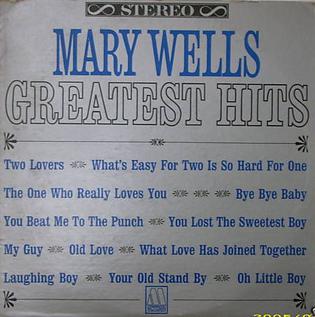 Into The Music sold used LPs; they probably had a small selection of new LPs from time to time but it wasn’t their main business by any means. But one day, for reasons that elude me, they procured a shipment of Motown Anthologies; this was back in the day when the vinyl copies still existed with the original cover art that was very different from what it would later be on CD. I picked up The Marvelettes, first time I’d seen it, and the last time I saw the vinyl copy.
Into The Music sold used LPs; they probably had a small selection of new LPs from time to time but it wasn’t their main business by any means. But one day, for reasons that elude me, they procured a shipment of Motown Anthologies; this was back in the day when the vinyl copies still existed with the original cover art that was very different from what it would later be on CD. I picked up The Marvelettes, first time I’d seen it, and the last time I saw the vinyl copy.
And Mary Wells. But unlike the others, Mary Wells did not have an “anthology.” Mary Wells, who left Motown after she hit it big with My Guy, could do no better than the Greatest Hits album that Motown released in 1965 as part of its Greatest Hits series, all of which, like the Anthology series later, had the same cover design.
Mary Wells, who was Motown’s first (and only, until Diana Ross went solo in 1970) successful female solo artist, had 12 top 100 hits on Motown through 1965, and had another 10 on 20th Century, Jubilee, and Atco through 1968. The latter, only one of which made the top 40, are not in wide circulation and aren’t really all that well-remembered. Her glory lies with the former.
Mary Wells:
• The One Who Really Loves You – Who’s to say who really loves whom? A song lyric borne of competition, it poses a challenge. But the one who really loves you isn’t necessarily what it’s all about. From the summer of 1962.• You Beat Me To The Punch – The dynamics of initiative. We children of the 70s remember the Charity Brown version of this, but here is the original in all its glory. From the fall of 1962.
• Two Lovers – It was Mary MacGregor who (weakly, I admit) challenged the mores of the world with Torn Between Two Lovers in 1977, and here the predecessor Mary gives us an early take, but she bails at the end. She has a BF, as it happens, with a psychological illness. I kid you not. Certainly one of the most bizarre storylines to come out of a Motown record. From the summer of 1963.
• Your Old Stand By – Told from the POV of an afterthought. These are not such simple I love you and you love me songs. Much credit to songwriter Smokey Robinson who had the courage to tackle complex emotional stuff in the context of top 40 radio, and this back in the early 60s when Jackson Browne was just a baby. From the summer of 1963.
• What’s Easy For Two Is So Hard For One – One could go all kinds of places with a title like that, but let’s don’t. From the winter of 1964.
• My Guy –Smokey Robinson may be the only male songwriter who could write so convincingly from the feminine side. Ok, nothing profound here, but colourful and cheerful and, it its own way, challenging. “No handsome face could ever take the place of my guy.” Think about it. And only Smokey could come up with a line like “I’m sticking to my guy like a stamp to a letter.” Her only number one hit, and her swansong for Motown. From the spring of 1964.
• Laughing Boy – That we don’t always show how we feel is a common theme in pop music, but it’s almost always told from the perspective of he who is doing the hiding. Here we have an interested observer. From the winter of 1963.
• What Love Has Joined Together
• Oh Little Boy (What Did You Do To Me) - We often hear “little girl;” “little boy” almost never. That whole male pride thing is at stake. She picks up the tempo on this, it could be a girl group hit but for the fact that there are no background singers on this at all.
• Old Love (Let’s Try Again) – Those old feelings don’t go away easily. Let’s try again, it works sometimes, not often.
• You Lost The Sweetest Boy – Not the handsomest / best looking, not the most athletic, not the wealthiest, not the smartest. From the fall of 1963.
• Bye Bye Love – Mary’s debut hit falsely places her as kind of a female Isley Brothers; it was a style she (or, more likely, Berry Gordy) abandoned quickly. But it suits her, and one wonders where her career would have gone had she followed up. From the spring of 1961.


No comments:
Post a Comment